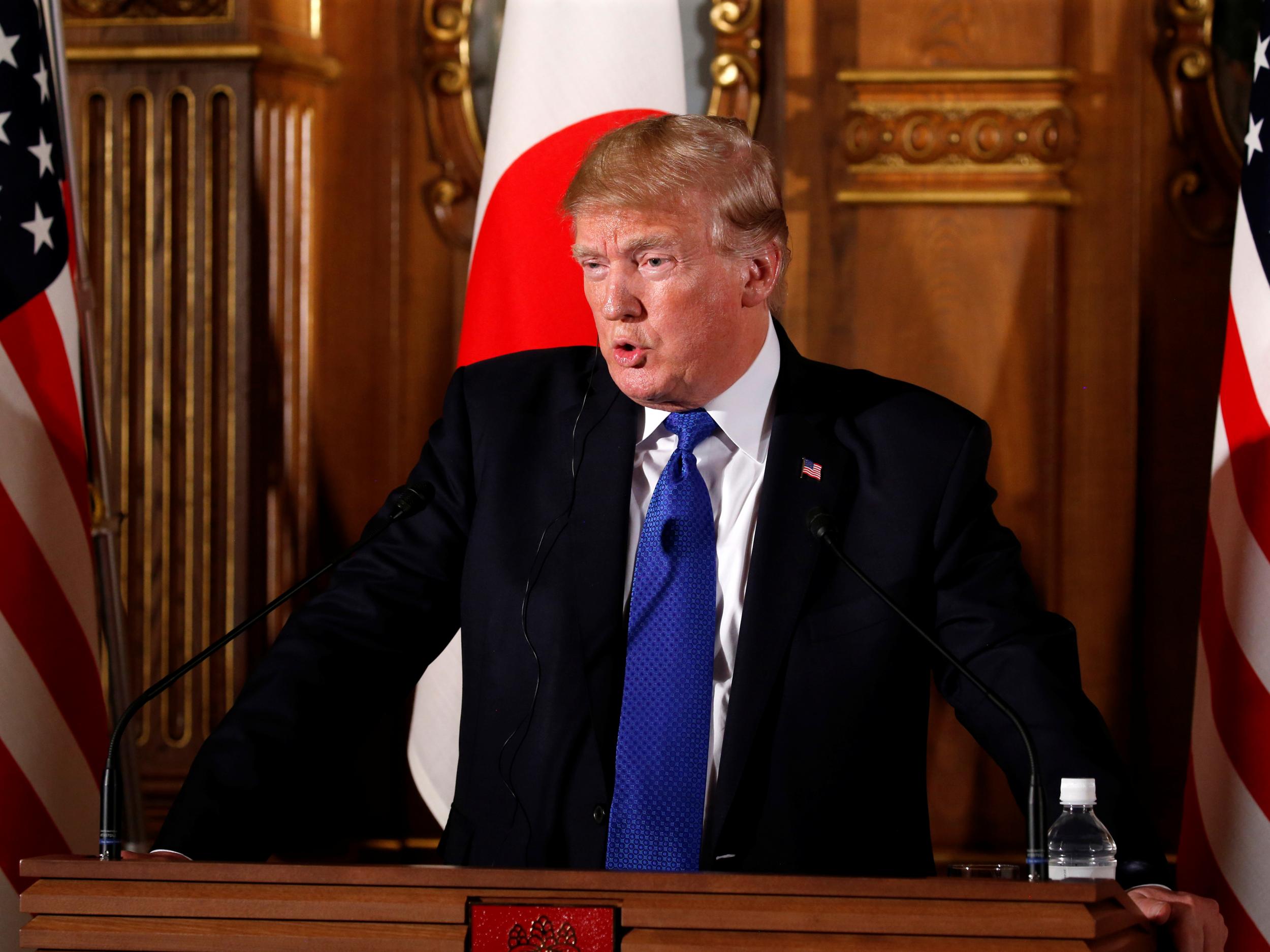Despite a disastrous first year, Donald Trump's economic policy could win him the 2020 election
Even if every single thing they say about Trump's collusion with Putin is true, a load of Facebook posts, Tweets and fake news about crooked Hillary were never going to be enough to topple him. Trump had a winning idea on the most important issue – the economy – and it didn’t turn up courtesy of the Kremlin


“America first. America first.”
Remember that, from the inauguration speech? A two word message, repeated. Trumpism at its purest. Donald Trump may be many things, and most of them deeply unlovely, but he won his election (according to the established rules of the US system) a year ago, and against the odds, for one very good reason: he promised the American people that he would put their interests first, and they believed him. His opponents in his party, and outside of it, badly underestimated him and the potency of that message – as Hillary Clinton now admits.
So that’s how he got into the White House. It wasn’t, actually, because of the Russians. Even if every single thing they say about his collusion with Putin is true, a load of Facebook posts, Tweets and fake news about crooked Hilary were never going to be enough to do it. Trump had a winning idea on the most important issue – the economy – and it didn’t turn up courtesy of the Kremlin.
Trump had, and has, a clear central political proposition; he puts America first economically. That’s the key to his second term. Unlike so much else on his agenda, he is likely to succeed in that. So that, I am afraid, is why he will win his second term in 2020, and, a little more fancifully, pave the way for an Ivanka Trump presidency to run from 2024 to 2032 (breaking the glass ceiling – how about that?). In fact, given that she is more of a Democrat, even a liberal, rather than a Republican or a Trumpite, that may be no bad thing – but I am getting way ahead of myself here.
Back to 2017 and the road to 2020: protectionist politicians can win elections. They do so because slapping punitive tariffs on imports, punishing companies that source production overseas and banning all sorts of goods and services on spurious grounds of health and safety or national security works.
Look, if you can bear it, at what they did to Bombardier over their sales of private jets in the US market. See what Trump has done already in bullying the auto giants into abandoning manufacturing in Mexico and preserving the US car industry. Tearing up Nafta and cancelling the trans-Pacific partnership are deeply stupid policies to any proper economist; but a proper economist should also concede that in the short run they will create jobs, and, thus, boost the political popularity of the man responsible. Simple as that.
History proves that many countries can grow extraordinarily rapidly under conditions of protectionism. The United States did so in the hundred years from the mid-nineteenth to the mid-twentieth century; the European Union has always been protectionist (externally), and done OK out of it; Japan and South Korea have also followed growth models where strategic domestic industries were long sheltered from foreign competition. China and India today do much the same, including managing their currencies.
There’s no question: free trade is good for consumers and workers because it means lower prices, and thus greater spending power and higher living standards. Yet those effects are incremental and, in a way, invisible, and generally not powerful politically. No one thanks the President for being able to buy a car that is $1,500 cheaper than it might otherwise be in some parallel universe.
Contrariwise, creating jobs and thus hopes for the future by replacing foreign imports of anything from steel girders to baseball caps with American substitutes creates a much more tangible sense of visible well-being. It drives the vote, just as it did it to get Trump into the White House in 2016.
In the short run, Americans will believe the policy is working, as protectionist policies always do, even if in the long run they are damaging to the economic welfare of Americans, let alone their neighbours and trading partners. Everything Trump does is geared up to that end, the America first thing, even including, quite bizarrely, specifying that the hamburgers he eats on his visit to Japan are filled with American beef, rather than the fancy Japanese wagyu variety, which would have done just as well, if not better.
If he brings the jobs back, then Trump will win his second term, no bother. He will also be aided by his ambitious infrastructure renewal programme; investing in America is in fact a cross-party cause, or ought to be. By their nature such projects as repairing bridges, building roads and, yes, even, the Mexican wall are labour intensive and tend to be focused on the domestic economy. You can be sure there will be an America first procurement policy there too.
On top of that, Trump’s tax reforms, if Congress ever lets him have them, will bring all those corporate profits home that are currently sitting around in tax havens across the world. There is a reason, you see, why Apple has its billions parked in Jersey in the Channel Islands, or Ireland before it. It’s because they do not want to bring the money “home” to America because they will get taxed so harshly on it. So they leave these vast piles of cash lying around anywhere but the US. Trump “gets” that.
Cutting US taxes on business is the other way to beat tax avoidance – because it no longer pays to hide the money. Investors now expect that the money may well come home and lead to some bumper dividend payments to shareholders when it is repatriated. Hence the boom in share prices and the stock market indices hitting all-time highs. Some of the cash may well also be used to fund investment and job creation in the US – that should be Trump’s quid pro quo if he is smart about it. Trillions of dollars may soon be headed back on-shore to the US – no-one can know how much has been marooned overseas over so many decades. I’d be surprised if that lot didn’t give some sort of boost to Main Street as well as Wall Street.
If he can get away with it, Trump will also cut taxes for working people, though perhaps biased towards the better off, with some pork barrel schemes in there too to satisfy the legislators.
In any case, Trump is creating some political opportunities for himself through his economic policies. These, come the mid-terms next year and the 2020 presidential contest, will be “lines” he can sell: more jobs, lower taxes, higher wages, more investment, lower trade deficit, stronger dollar. He made America great again, will go the slogan, and Trump put America first; now America will be asked to put Trump first.
You should recall, too, by the way, that very few presidents are refused a chance to continue into a second term; only George HW Bush (against Bill Clinton in 1992), Jimmy Carter (to Ronald Regan, 1980), and Herbert Hoover (to Franklin Roosevelt in 1932) have been refused in the past century. I am sorry to say that racism, sexism, misogyny, buffoonery, arrogance, painful intellectual insecurity, small hands, long ties, strange hair, policy failures on health, Korea or immigration, gun control nor the whole Russian thing will deprive Trump of four more years in the White House – if he “fixes” the economy.
That prospect, as I say, is why he will survive, most likely, any number of attacks by his enemies in the media, from NBC and the New York Times to Louise Mensch’s impressively detailed patribotics blog. He will outlive the indictments of those around him by Robert Mueller, and he will shrug off sniping from the political establishment, including, it seems his two immediate Republican predecessors, George HW Bush and George W Bush. Even impeachment itself won’t work if public opinion is unsympathetic to it.
Abraham Lincoln once put it so simply: “In this age, in this country, public sentiment is everything. With it, nothing can fail; against it, nothing can succeed.”
Do not underestimate Trump again.


Join our commenting forum
Join thought-provoking conversations, follow other Independent readers and see their replies